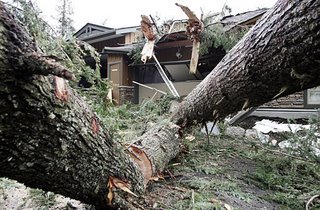 Stephane Dion’s surprising smackdown of the Liberal backroom boys was not just highly amusing, it may also signal a much-needed infusion of new blood into Canada's "natural governing party".
Stephane Dion’s surprising smackdown of the Liberal backroom boys was not just highly amusing, it may also signal a much-needed infusion of new blood into Canada's "natural governing party". More importantly however, it showed that the old Liberal powerbrokers had grossly miscalculated the growing importance of the environment to Canadians as the defining issue of coming century.
As a longtime environmentalist, I can attest that the political machinery of all leading parties have never really treated this issue as anything more than a baby kissing photo op. Seeing Chrétien at the podium last weekend thundering about how he had championed Kyoto, while his government presided over a 25% increase in carbon emissions was a stomach-churning case in point.
However, the days when such empty rhetoric would pass public muster appear to have thankfully come to an end. An Environics poll this month showed that the environment is now second only to health care as the leading issue for Canadians. This rapid climb from public opinion obscurity has been astonishing.
In the 1990’s the environment as the leading issue to Canadians hovered around 5%. Even in the last election, only 4% of Canadians felt it was the most important issue. Five months ago, it had risen to 10%. Last month’s poll showed the environment was the leading issue for 13% of Canadians – ahead of the economy, the mission in Afghanistan or crime.
On climate change specifically, the numbers are even more compelling. In 1999, only 2% of Canadians polled thought global warming was the leading environmental problem facing the country. By 2004 that figure had risen to 4%. Last year it was 7%. By this year it had rocketed up to 20%.
This surge of support for a clean and healthy environment shows no signs of slowing and Mr.Dion shrewdly surfed this wave to victory past his party’s establishment, and the anointed frontrunners. His 53-page energy and climate platform clearly distinguished him from other candidates in the running, and struck a chord with younger delegates whose future hangs in the balance.
The sea change of public opinion is being driven by a realization by average Canadians of the enormous implications of global warming. This is a culmination of ever more stark scientific findings on what a climate altered Canada would mean for our children, as well as what Canadians are seeing already with their own eyes.
Vancouver just ended the largest boil water advisory in Canadian history as a result of record-breaking storms battering the BC coast. Recent research from the University of Washington shows that this type of “extreme” weather on Canada’s west coast will likely become the norm as a warmer North Pacific Ocean churns out more powerful and wetter winter storms.

Warming winters in BC have allowed an explosion in the mountain pine beetle population, which now affects an area of forest three times the size of Vancouver Island and is growing by 40% every year. By the time this epidemic has run it’s course it will have impacted 25,000 forest dependant families in 80 BC communities and obliterated $20 billion dollars in commercial timber.
Canadians are waking up to such challenges and are looking for leaders with vision and commitment that will lead our country into the new century. Mr. Dion appears to be such a man and his victory will provide Canadians a very clear choice in the next election.
For his part, Stephen Harper’s credibility on the climate file is only slightly more balmy than absolute zero. His much-hyped Clean Air Act was widely ridiculed as an empty ruse that would do nothing to cap carbon emissions until at least 2020.
Last April, Harper signaled his disdain for fighting global warming by abruptly canceling fifteen federal programs meant to reduce greenhouse gas emissions. Last month he axed a further five related programs at Agriculture Canada, bizarrely asking the soon-to-be-redundant public servants to help with media spin control.
While Harper is no eco-hero, he is also a shrewd and capable politician. Can Dion beat him at the polls? Given that Dion has just vanquished the most seasoned political veterans in his own party, so far I am impressed.
If he does become Prime Minister it remains to be seen whether the Liberal party, which in the past has failed miserably to reduce carbon emissions, can be trusted to deliver on this critical issue.
However, Mr. Dion’s victory over not only his rivals but the party establishment means two things: Not only does he now hold the reins of power to begin to effect such changes, he will also face much less internal opposition from the hoary pragmatists in his party that have blocked such progress in the past.
Godspeed Mr. Dion. I might just vote for you.
Mitchell Anderson is a freelance writer living in Vancouver. This piece ran nowhere.